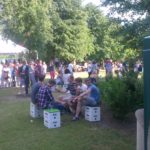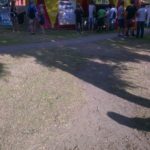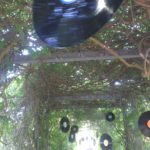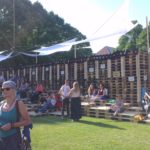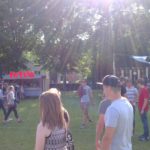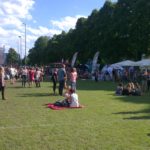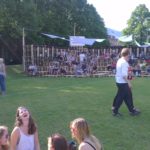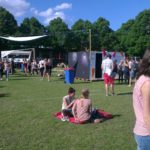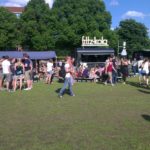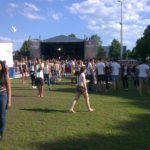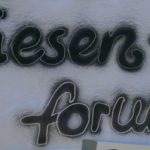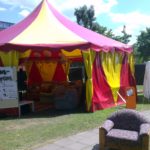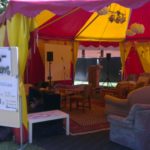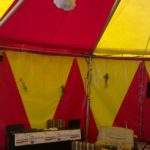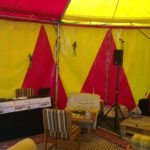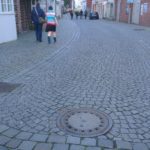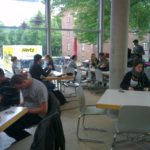 From the 15th till the 18th of January we participated in the Taking Care of Things Meeting at the Stadtarchiv Lüneburg Germany. This was also the closing event for the Post Media Lab Incubator project at Leuphana University and our research fellowship with them.
From the 15th till the 18th of January we participated in the Taking Care of Things Meeting at the Stadtarchiv Lüneburg Germany. This was also the closing event for the Post Media Lab Incubator project at Leuphana University and our research fellowship with them.
The visit began with a tour of the city archive during which we heard about the main activities of the institution not least the film, map and image collections. They wish to extend access to these via street access sync points in the near future.
 We convened one of seven care groups Mesh Media! to look at open, collaborative systems that facilitate collective abilities to store, curate, share, edit, redistribute and re-purpose media while at the same time creating new frames of reference and practice in public. We were pleased to have presentations by Eric Kluitenberg of Tactical Media Files, Volker Grassmuck and Jan Torge of ‘InternetTV for the newMedia Generation’ Grundversorgung, open wireless network advocates Freifunk Lueneburg and Robert Ochshorn with Interlace. (See last section for more details..)
We convened one of seven care groups Mesh Media! to look at open, collaborative systems that facilitate collective abilities to store, curate, share, edit, redistribute and re-purpose media while at the same time creating new frames of reference and practice in public. We were pleased to have presentations by Eric Kluitenberg of Tactical Media Files, Volker Grassmuck and Jan Torge of ‘InternetTV for the newMedia Generation’ Grundversorgung, open wireless network advocates Freifunk Lueneburg and Robert Ochshorn with Interlace. (See last section for more details..)
 Media was selected from the respective archives and uploaded to publicly presented syncronisation points adjacent to each Freifunk node in Lueneburg city centre.
Media was selected from the respective archives and uploaded to publicly presented syncronisation points adjacent to each Freifunk node in Lueneburg city centre.
 We produced a map to illustrate the locations of syncronisation points as a data trail which was toured by a small group of Lueneburg locals. They were encouraged to scan the QRcode posters and NFC tags they found on the street first connecting to Freifunk wireless then activating the BTsync to distribute the images and films.
We produced a map to illustrate the locations of syncronisation points as a data trail which was toured by a small group of Lueneburg locals. They were encouraged to scan the QRcode posters and NFC tags they found on the street first connecting to Freifunk wireless then activating the BTsync to distribute the images and films.
Please try these BTsyncs yourself 1|2|3|4|5|6|7|8|9|10|11|12 – or get the set! confused ? see the howTo..
 The post-medial is not tied to any particular modality of media, neither to “new” or “old”, “digital” or “analog”, nor to “connected” or “offline”. Nevertheless it relies on new medial affordances (what? affordances! :-)) and possibilities, allowing for new kinds of collective repositories and living archives. How can these new collecitve, transitory and ad-hoc repositories of ‘many media’ look like? What are their (possible) protocols of turning consumers into makers, individuals into groups, and media into structured, living and meaningful (micro-)social memory? What are possible assemblages that withstand idiosyncrasy and expert-ism, but are ‘avant-garde’ and progressive in form and function nevertheless?
The post-medial is not tied to any particular modality of media, neither to “new” or “old”, “digital” or “analog”, nor to “connected” or “offline”. Nevertheless it relies on new medial affordances (what? affordances! :-)) and possibilities, allowing for new kinds of collective repositories and living archives. How can these new collecitve, transitory and ad-hoc repositories of ‘many media’ look like? What are their (possible) protocols of turning consumers into makers, individuals into groups, and media into structured, living and meaningful (micro-)social memory? What are possible assemblages that withstand idiosyncrasy and expert-ism, but are ‘avant-garde’ and progressive in form and function nevertheless?
_object/ive (for ‘Parliament of Things’)…?!
_Schedule
16th January morning: Introduction
- 10:30 – 12:30: Introduction of people and workshops + overall choreography *For this we ask you to bring and present an object (any kind of object) that you relate to, care about and are willing to donate to the archive.*
16th January afternoon: Freifunk & Grundversorgnung present their projects & Freifunk nodes flashing
- 14:00 – 15:00: Grundversorgung (CDCvideo.de, online video interview tool, VODO.net, OPD, Poparchiv) & WikiVision
- 15:00 – 16:00: Freifunk presentation
- 16:00 – 18:00: Flashing Freifunk Node & installing them in Lueneburg (10 nodes have been ordered & arrived @ Grundversorgung) // Uploading of materials to an Interlace instance (preparation for Friday afternoon) -> create map of all the freifunk nodes in lueneburg one could walk (for Saturday)
17th January, morning: Interlace & Tactical Media Files presentation
- 10:00 – 11:00: Tactical Media Files: Presentation about archiving as part of a ‘living’ cultural process, which means that it happens also very much outside of the digital, in embodied encounters and ‘lived practices’ (activism, artistic production, and more).
- 11:00 – 12:00: Interlace:
17th January, afternoon:
- 12:00 – 14:00: All together Now! – reviving the legendary ‘Brown Bag’ Session a collective Power-Thought-Exchange-Lunchy-Thing Groups share and receive food and feedback.
- 14:30 – 18:00: Media Mesh: Collaborative editing on Interlace with ‘Tactical Medie Files’ & ‘Lueneburg City Archive’ materials (needs preparation & uploading of materials)
- 21:00 PUBLIC*: Zum Kollektiv, Scharffsches Haus, Heiligengeiststr. 38, 21335 Lüneburg *Screening Things* – an open, partly curated public screening including footage from the Stadtarchiv and works by ‘Taking Care of Things!’ participants
18t January, morning: Start the derive of Lueneburg @ Freiraum
- 11:00 – 12:00: Meeting @ Freiraum, presenation Freiraum & Freifunk
- get bittorrent sync to work on mobile phones
18th January, afternoon: Finish the walk @ city archive, meet up & exchange experiences
- 12:00 – 14:00: walk through Lueneburg, download media from freifunk nodes over bittorrent sync
- 14:00 – 17:00: Meeting @ City Archive */Stadtarchiv/ *Parliament of Things * a public fair and exhibition displaying the results of the two-day workshop intermixed with city archive material—an opportunity for the local public to engage with ‘Taking Care of Things!’ and the Stadtarchiv in a variety of activities igniting & deepening conversations around archives, life-cycles and care.
_Participants
- is a media sociologist, free-lance author and activist, has conducted research on the knowledge order of digital media, on copyright and the knowledge commons at Free University Berlin, Tokyo University, Humboldt University Berlin and University of São Paulo and is currently directing the project “Public Service Media 2.0” at the Centre for Digital Cultures (CDC) of Leuphana University Lueneburg. He was project lead of the conference series Wizards-of-OS.org and of the copyright information portal iRights.info, co-founded mikro-berlin.org, privatkopie.net and CompartilhamentoLegal.org and blogs at vgrass.de.
_Keywords
Many Media, kollektive Interface | collective interfaces, Wilde Netzwerke | Wilderness Networks, lokale Übertragung+Speicher | local Transmission+Storage
_Brainstorming
Possible ideas:
– Work with Freifunk to display site specific (deep-linked) Interlace sections
– If we use a NAS @ Deckspace we could use the
http://Deckspace.TV container on which Interlace is already running (robert what do you think?)
– we make timecapsules with the archive material -> embedded / injecting meta data into the objects -> share these objects as secrets during the workshop?
– Do a walk/derive on Saturday through Lueneburg, starting from Freiraum (
http://www.freiraum-lueneburg.de/), exploring the Freifunk nodes, which are deep-linking into the city archives
Possible actions:
– Attach a NAS to the Freifunk node UK
– Thus creating a network between Germany, Sweden, UK (concerning media law & ‘public spheres’ one would have to consider a pan-european publishing network)
– Order 10 Freifunk Nodes – done (Volker)
– Rent small Freiraum room for Saturday morning (two hours) -> budget?
_Freifunk places that are linked:
– Freiraum / Salon Hansen
– Post Media Lab / CDC / Grundversorgung
_Freifunk places to link:
– Stadtarchive
– Anna & Arthur
– Pons bar
– Hausbar
– Apothekenstr
– Cinema Scala
– Jekyl & Hide
– Cafe fleur
– Zum Kollektiv
– Nina home
(see the map above for final list)
_some more links/stuff
_Official Schedule
PROGRAM_January 15-18__Taking Care of Things!_
organized by Post-Media Lab, Habits of Living; in cooperation with Stadtarchiv
Lüneburg
_Wednesday, Jan 15 PUBLIC_
*18:00*
Oliver Lerone Schultz: ‘Intersecting Cycles – A Welcome to a kind of Goodbye’
Nishant Shah: ‘Laying the Grounds – Archives, Life-Cycles, Care’
*18:30*
Kelly Dobson: ‘Why It Matters The Way Things Break’
– introduced by WendyChun
*19:30*
‘Published Things’ – a temporarily installed Public Library offering the first
charge of Post-Media Lab publications. Bring your own devices to download them live!
– Hosted by Clemens Apprich and Marcell Mars
_Thursday, Jan 16 INTERNAL_
*10:00 – 10:30*
‘Opening Up the Archive’: Stadtarchiv Lüneburg – A guided Tour by Danny Kolbe
(Stadtarchiv)
*10:30 – 12:30*
Introduction of people and workshops + overall choreography*For this we ask you to bring and present an object (any kind of object) that
you relate to, care about and are willing to donate to the archive.*
*12:30 – 14:00*
Lunch
*14:00 – 18:00*
6 Care Groups (workshop time)
*19:00*
Group Dinner at a local brewerie (Mälzer)
_Friday, Jan 17 INTERNAL_
*09:30 – 12:00*
6 Care Groups (workshop time)
*12:00 – 14:00*
All together Now! – reviving the legendary ‘Brown Bag’ Session
a collective Power-Thought-Exchange-Lunchy-Thing
Groups share and receive food and feedback.
*14:00 – 14:30 Fresh air & coffee*
*14:30 – till Brooklyn!*
6 Care Groups (workshop time)
*21:00 PUBLIC*
Zum Kollektiv, Scharffsches Haus, Heiligengeiststr. 38, 21335 Lüneburg*Screening Things*
an open, partly curated public screening including footage from the Stadtarchiv
and works by ‘Taking Care of Things!’ participants
_Saturday, Jan 18 INTERNAL_
*until 13:00*
Set-up ‘Parliament of Things’
*13:00 – 17:00 */Stadtarchiv/
*Parliament of Things *
a public fair and exhibition displaying the results of the two-day workshop
intermixed with city archive material—an opportunity for the local public to
engage with ‘Taking Care of Things!’ and the Stadtarchiv in a variety of
activities igniting & deepening conversations around archives, life-cycles and care.
_Sunday, Jan 19_
*10:00*
Breakfast for those still in town.
 “What I had in mind is that the research would focus on an area covered by a local network either permanently or at least during the duration of the project. This network would host locally crafted educational material and floss applications that would showcase emerging tools and technologies. This could be as simple as a single web hosting device offering short-range access or a community mesh network with broader objectives. “
“What I had in mind is that the research would focus on an area covered by a local network either permanently or at least during the duration of the project. This network would host locally crafted educational material and floss applications that would showcase emerging tools and technologies. This could be as simple as a single web hosting device offering short-range access or a community mesh network with broader objectives. “There is a swell of social, cultural and creative interest along Creekside in Deptford where we have enjoyed success in the past. We hope to rekindle interest and activity in support of the Mazi workshop program and the adoption of a locally delivered alternative to commercial web dependencies. Meanwhile the whole area is being “developed” so there are rising blocks on every quarter isolating areas of Deptford which will present a challenge when fixing links and bridging ideas.
A 2nd world war Minesweeper is moored alongside one of few remaining light industrial estates off Norman Road. It has a mixed crew of arty anarchos who screen print t-shirts and lead on refurbishment of the aged hull, host great parties and a flotilla of smaller boats. Madcap Coalition have just moved to one of the remaining warehouses adjacent to the cement works by the Creek Road lifting bridge. Finally at the mouth a new pedestrian swing bridge links between swanky new condo’s before the creek tips into the Thames.

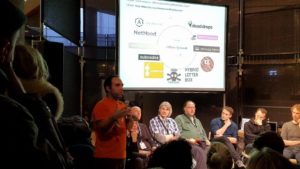














 Paulo is a photographer and cultural studies tutor currently working on proposals for a Deptford walking/map project with British Library Archives fund so we were able to confer on techniques for street signage with qrcodes and NFC to promote linking and syncing of pictures and maps available.
Paulo is a photographer and cultural studies tutor currently working on proposals for a Deptford walking/map project with British Library Archives fund so we were able to confer on techniques for street signage with qrcodes and NFC to promote linking and syncing of pictures and maps available. Gargi Sen from
Gargi Sen from  Adnan Hadzi wasn’t available to contribute today as he is travelling with
Adnan Hadzi wasn’t available to contribute today as he is travelling with 


 Irational will also organise a workshop in Lueneburg, the week before we run the Deckspace.TV workshop, on “
Irational will also organise a workshop in Lueneburg, the week before we run the Deckspace.TV workshop, on “ Javier arrived bang on time for the start of the session at 11am so we had plenty of opportunity to discuss current work and indulge in a little nostalgia for 1999-2003 during the early days of
Javier arrived bang on time for the start of the session at 11am so we had plenty of opportunity to discuss current work and indulge in a little nostalgia for 1999-2003 during the early days of 
 Giovanni d’Angelo was one of the key backspacers and also joined us again for further excavations as we distilled the stored materials into specially cleared shelves in preparation for closer examination and processing. Before long tables already loaded with lunch debris are joined by contents of the cd racks and VHS silos. The
Giovanni d’Angelo was one of the key backspacers and also joined us again for further excavations as we distilled the stored materials into specially cleared shelves in preparation for closer examination and processing. Before long tables already loaded with lunch debris are joined by contents of the cd racks and VHS silos. The 
